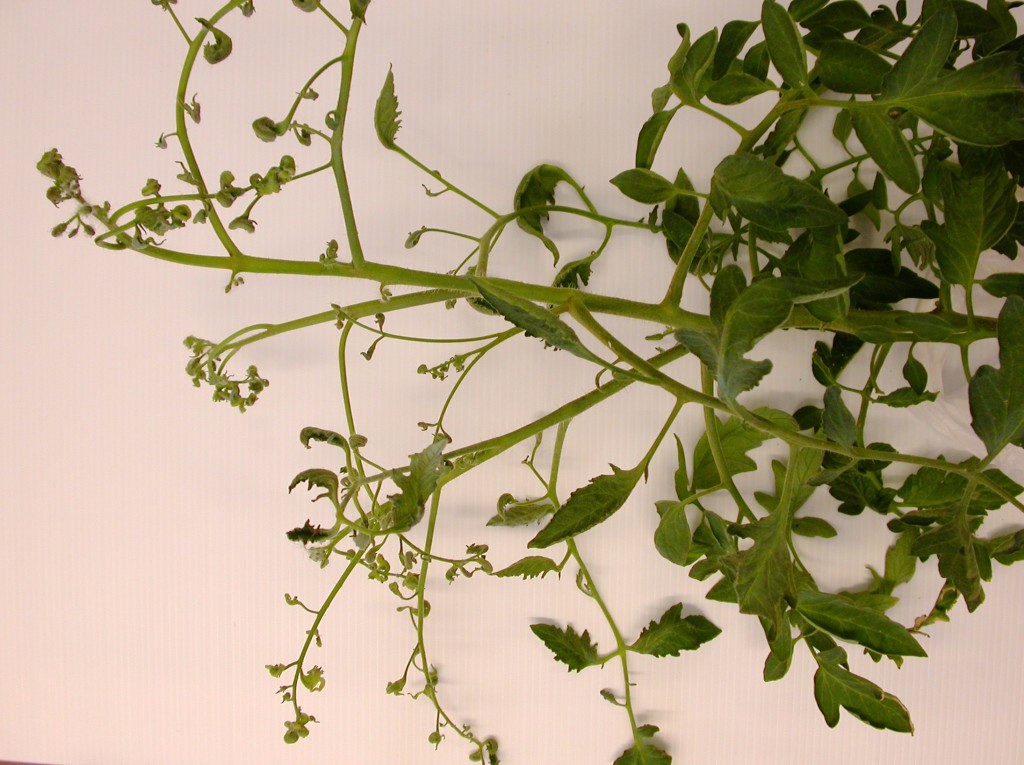Nacogdoches, Texas, USA
January 22, 2015

A pesticide used to control broadleaf weeds in hay pastures can survive in composted straw and manure for years, possibly causing injury to tomatoes and other garden vegetables, according to a Texas A&M AgriLife Extension Service expert. (Photo by Dr. Joe Masabni, Texas A&M AgriLife Exten sion Ser vice vegetable specialist)
Commercial vegetable growers are facing a new problem: Some commercial composts can contain herbicide residues that will cause mutant tomatoes and other vegetables, according to a Texas A&M AgriLife Extension Service horticulturist.
The herbicide aminopyralid is primarily used for control of broadleaf weeds in pastures, said Dr. Joe Masabni, AgriLife Extension vegetable specialist, College Station. The problem arises when growers use straw mulch composted from hay pastures or composted manure from animals grazing on treated pastures.
“This is a very serious concern for all growers,” he said. “The herbicide can survive the animal digestive system and for three years or longer in the compost pile.”
Masabni is one of the featured speakers at the East Texas Commercial Fruit and Vegetable Conference, set Feb. 24 at the Nacogdoches Expo Center, 3805 NW Stallings Drive, Nacogdoches.
Registration before Feb. 20 for the conference is $30 per person, $50 for couples. There will be a $5 late fee added to registration after Feb. 20. Lunch is included with the registration. Registration will start at 8:30 a.m., with programming beginning at 9 a.m. The conference will adjourn at 3 p.m.
To register or for more information, call the AgriLife Extension office for Nacogdoches County at 936-560-7711. Checks should be made out to Nacogdoches Master Gardener Association and mailed to: Texas A&M AgriLife Extension Service, 203 W. Main St., Nacogdoches, TX 75961.
Masabni will discuss the latest research results on using activated charcoal to neutralize aminopyralid herbicide in soils. He will also discuss how to calculate herbicide rates for a small volume like a backpack sprayer when labeled amounts are only shown for large acreages. And, he will discuss the finer points of both organic and conventional weed control.
Morning topics and speakers will include:
- Blackberry, Blueberry and Kiwi Production, Dr. David Creech, Regent’s professor at Stephen F. Austin University and director of the university’s Mast Arboretum, Nacogdoches.
- Muscadine Grape Production, Dr. Justin Scheiner, AgriLife Extension viticulturist, College Station.
- Something Sprouts in Nacogdoches: A New Student Edible Garden at SFASU, Dr. Jared Barnes, professor of horticulture, Stephen F. Austin State University, Nacogdoches.
- Veggie Tales from a Lifetime Gardener, Greg Grant, research associate at the Piney Woods Native Plant Center, Nacogdoches, and contributing editor to Texas Gardener magazine.
The video “Protecting Your Pollinators for Fruit and Nut Growers,” produced by Erfan Vafaie, AgriLife Extension integrated pest management specialist, Overton, will be shown during lunch.
After-lunch speakers and topics will include:
- Peach Production: Challenges and Opportunities, Monte Nesbitt, AgriLife Extension horticulturist, College Station.
- Rainwater Harvesting and Irrigation, Dotty Woodson, AgriLife Extension agent for horticulture, Dallas.
- Vegetable Diseases, Dr. Thomas Isakeit, AgriLife Extension plant pathologist, College Station.
Holders of Texas Department of Agriculture pesticide applicator licenses will earn two continuing education units in the general category for attending. Master Gardeners will earn five hours of continuing education recertification credits.
Sponsors include Irrigation Mart Inc., Heritage Land Bank and Earthwise Organics.